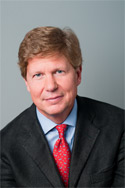March 31, 2015
Lecture will explore role of faith in politics
 CARBONDALE, Ill. -- There is an old axiom that suggests religion and politics don’t mix. But faith has often influenced the country’s political course since the nation’s founding.
CARBONDALE, Ill. -- There is an old axiom that suggests religion and politics don’t mix. But faith has often influenced the country’s political course since the nation’s founding.
An upcoming lecture at Southern Illinois University Carbondale by Randall Balmer, historian and chair of the Department of Religion at Dartmouth College, will provide some perspective on how two distinct, but sometimes combustible staples of American life co-exist.
Balmer will present “His Own Received Him Not: Jimmy Carter, Progressive Evangelicalism and the Religious Right,” at 7 p.m., April 9, in the SIU School of Law Hiram H. Lesar Building auditorium. Sponsored by the Paul Simon Public Policy Institute, the lecture is part of the John and Muriel Hayward Lecture series. Created in 1999, the series brings in distinguished guests to lecture in the general area of politics and religion or politics and the arts.
Balmer, also an Episcopal priest and Emmy Award nominee, is “one of the nation’s leading scholars on religion and politics,” David Yepsen, institute director, said.
Including the book on Carter, Balmer has published more than a dozen books, including “Mine Eyes Have Seen The Glory: A Journey into the Evangelical Subculture in America,” which is now in its fourth edition. The book was made into an award-winning, three-part PBS documentary. He also wrote and hosted a two-part series on creationism and a documentary on the Rev. Billy Graham.
Yepsen, the long-time political writer, editor and columnist for the Des Moines Register, said he has known Balmer for a long time because of treks to Iowa to study the role of social conservatives in Republican presidential politics. Balmer’s latest book looks at the role of faith in Carter’s presidency and his life and “is an excellent study in how evangelicals, having supported Jimmy Carter’s campaign in 1976, turned to Ronald Reagan in 1980,” Yepsen said.
“Religious faith has been a factor in American politics since the earliest days,” Yepsen said. “Issues like slavery, abolition, temperance, war and civil rights were all shaped by strong religious influences. You can’t understand American politics without understanding religion in America and Dr. Balmer’s lecture will help us understand a small portion of it.”
For more information on this or any other institute program, contact the institute at 618/453-4009 or visit paulsimoninstitute.siu.edu.
